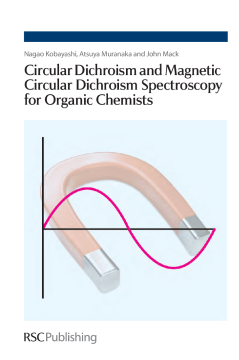
BOOK
Circular Dichroism and Magnetic Circular Dichroism Spectroscopy for Organic Chemists
Nagao Kobayashi | Atsuya Muranaka
(2011)
Additional Information
Book Details
Abstract
CD and MCD spectroscopy can provide key information about the conformations and electronic states of chromophore containing molecules. However, the theory has remained too challenging and inaccessible for many organic chemists and biochemists and only a few researchers have carried out detailed quantitative analyses of their spectral data. This is not surprising as people who excel at spectroscopic theory usually lack the skills set required to design and synthesise the molecules that would be most appropriate for describing and explaining the theory of CD and MCD spectroscopy. Most of the books that have been written on the subject have, therefore, been based on very dense sets of mathematical equations. This timely book rectifies that situation by summarizing the relationship between the different types of spectra and by describing in detail the qualitative and quantitative methods which can readily be used to analyse CD and MCD spectral data. During the last decade the authors have successfully synthesized several molecules to illustrate key points related to the theory of CD and MCD spectroscopy, resulting in this definitive book providing key practical knowledge in a readily accessible style. It is aimed primarily at organic chemists and biochemists and is required reading for researchers active in the field. In the introduction, the book describes the types of information that can be derived from CD and MCD spectroscopy. After a detailed explanation of the theory of electronic absorption spectroscopy, it then provides practical in depth examples of the various analytical methods that can be carried out with CD and MCD spectral data. This makes the theory of these techniques much more accessible for researchers who do not specialise in physical chemistry. The book concludes by briefly summarizing the key mathematical expressions associated with each technique.
Nagao Kobayashi is in the Department of Chemistry, at the Graduate School of Science, Tohoku University, Sendai, Japan. He received his D.Sc. on the magnetic circular dichroism (MCD) of catalase and peroxidase in 1978 and a second Dr. of Pharmacy degree on the electrocatalytic reduction of oxygen using water-soluble porphyrins and phthalocyanines in 1986 from Tohoku University. He has written papers for the journals - JACS, Angew. Chem. and the Chem. Eur. J. and has had a large number of papers published in other high impact factor journals such as Inorg. Chem.,J. Phys. Chem. and Chem. Commun. Overall he has authored about 300 original research papers and has written more than 20 book chapters and reviews on the synthesis and spectroscopy of porphyrins, phthalocyanines, and cyclodextrins. In 2006, he received a Chemical Society of Japan Award for Creative Work in the Field for research involving CD and MCD spectroscopy. The core focus of his research has been the use of electronic absorption, CD and MCD spectroscopy and electrochemical methods to study metal porphyrinoid complexes. Atsuya Muranaka is at the Institute of Physical and Chemical Research (Riken), Wako-shi, Saitama, Japan. He received his B.Sc. degree from Tohoku University in 1999 and received a Ph.D. degree on the CD and MCD studies of oligomeric porphyrins and phthalocyanines from the same university in 2006. Since June 2004, he has been an assistant professor initially working with Prof. N. Kobayashi at Tohoku University and then, since August 2007, with Prof. Masanobu Uchiyama at RIKEN. He was awarded poster prizes during the International Conferences on Circular Dichroism in 2003 and 2007. In 2003-2004, he spent a year as a visiting researcher in the laboratory of Prof. Arnout Ceulemans at the Katholieke Universiteit Leuven in Belgium after receiving funding from the university as a distinguished PhD course student. His current research interests lie in the synthesis, spectroscopy and theoretical studies of porphyrinoids and various element-containing aromatic molecules. He has published many original research papers in high impact journals such as J. Am. Chem. Soc., Chem. Commun., Inorg. Chem., J. Phys. Chem., J. Org. Chem and Chem. Eur. J.
